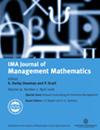门诊排队系统中的动态溢出分流模型
IF 4.3
3区 工程技术
Q3 MANAGEMENT
引用次数: 0
摘要
在医疗服务体系中,当专家席位紧缺时,传统的排队方式难以充分利用医院资源。在不改变现有资源的前提下,建立马尔可夫排队系统中的分流溢出模型,在一定条件下将专家队列中的部分病人溢出到普通队列中,合理分配每个门诊病人的容量。利用仿真软件 ProModel 进行的数值仿真表明,平均队列长度、等待时间等服务指标均优于传统模型。本文章由计算机程序翻译,如有差异,请以英文原文为准。
A dynamic overflow triage model in an outpatient queuing system
In the medical service system, when the number of expert seats is in short supply, it is difficult to make full use of hospital resources by the traditional queuing method. Without changing the existing resources, an overflow model with triage in a Markov queuing system is established by overflowing a part of patients in the expert queue into the general queue under a certain condition to allocate reasonably the capacity of each outpatient. The numerical simulation using ProModel, a simulation software, shows that the average queue length, waiting time and other service indices are better than the traditional models.
求助全文
通过发布文献求助,成功后即可免费获取论文全文。
去求助
来源期刊

IMA Journal of Management Mathematics
OPERATIONS RESEARCH & MANAGEMENT SCIENCE-MATHEMATICS, INTERDISCIPLINARY APPLICATIONS
CiteScore
4.70
自引率
17.60%
发文量
15
审稿时长
>12 weeks
期刊介绍:
The mission of this quarterly journal is to publish mathematical research of the highest quality, impact and relevance that can be directly utilised or have demonstrable potential to be employed by managers in profit, not-for-profit, third party and governmental/public organisations to improve their practices. Thus the research must be quantitative and of the highest quality if it is to be published in the journal. Furthermore, the outcome of the research must be ultimately useful for managers. The journal also publishes novel meta-analyses of the literature, reviews of the "state-of-the art" in a manner that provides new insight, and genuine applications of mathematics to real-world problems in the form of case studies. The journal welcomes papers dealing with topics in Operational Research and Management Science, Operations Management, Decision Sciences, Transportation Science, Marketing Science, Analytics, and Financial and Risk Modelling.
 求助内容:
求助内容: 应助结果提醒方式:
应助结果提醒方式:


